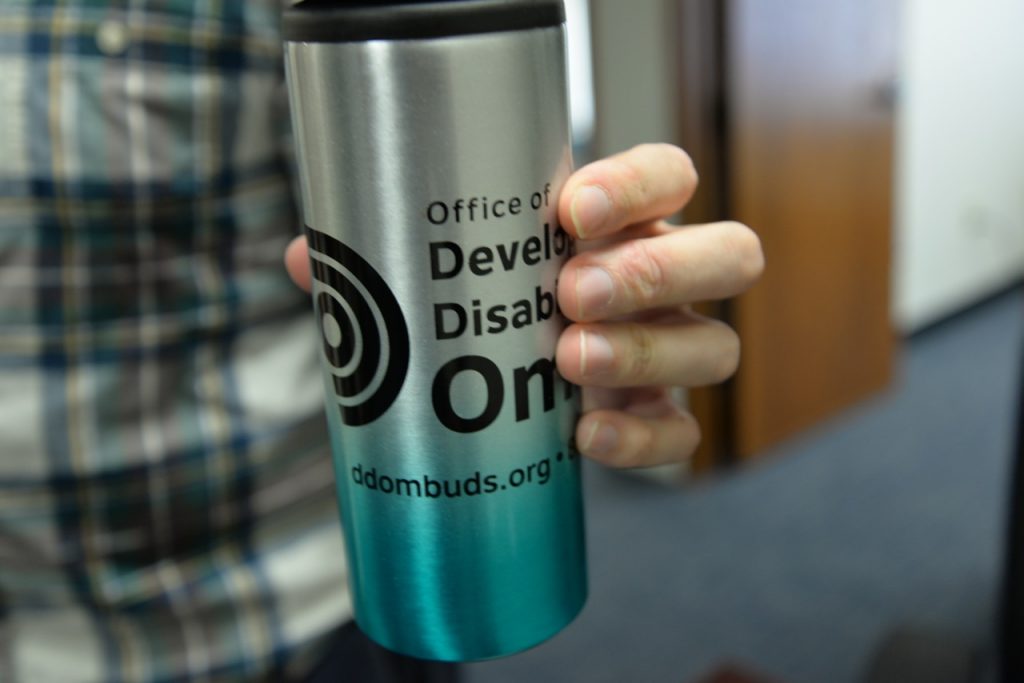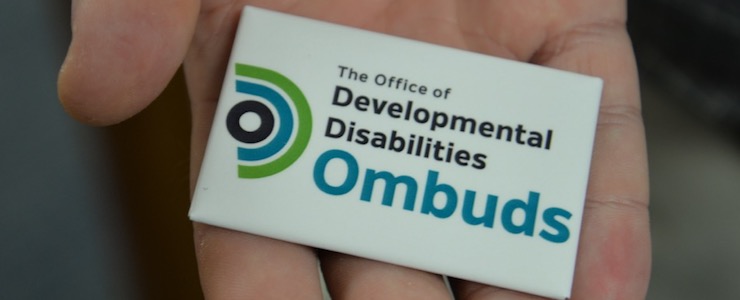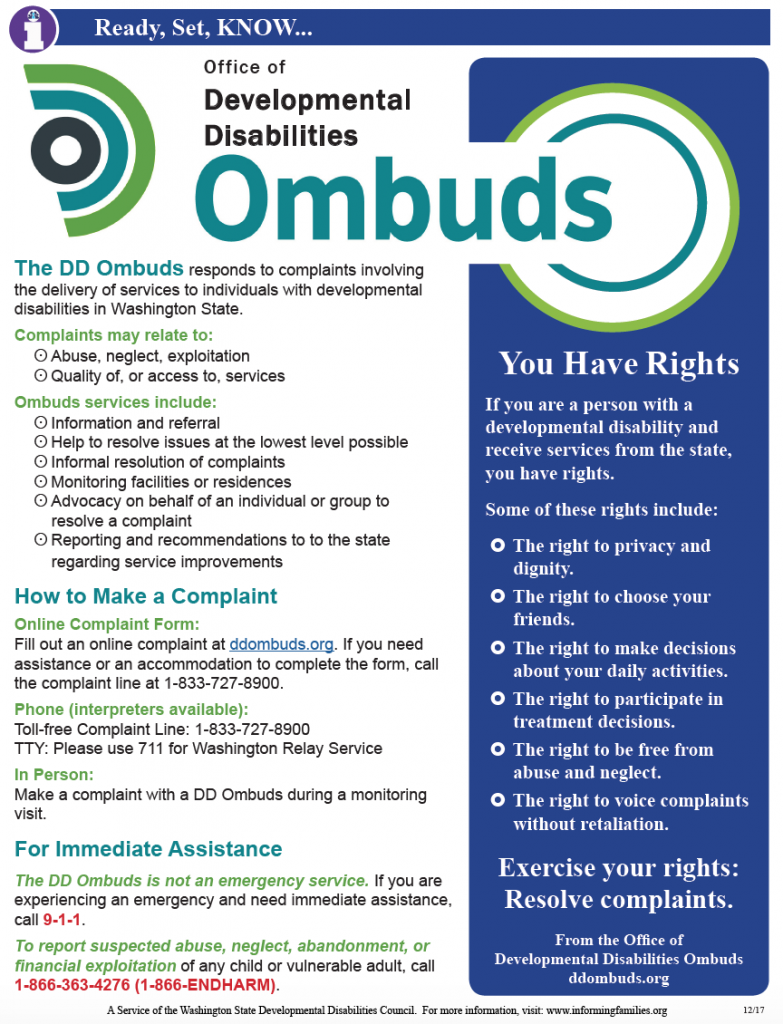
For decades, DD advocates sought improved oversight and investigation of complaints of abuse against individuals with developmental disabilities. In 2016, the legislature finally took action with the creation of Laura’s Law, named after Laura Gholston, a woman with developmental disabilities who was severely abused by a her state-paid caregiver—a nephew with a history of drug use who had been identified as a potential perpetrator of sexual assault against Laura years earlier.
In addition to enhanced case management and more frequent visits for clients like Laura who are at greater risk for abuse, Laura’s Law established the Office of DD Ombuds, charged with investigating and responding to complaints involving individuals with developmental disabilities who receive state services.
The Office of Developmental Disabilities Ombuds launched last May, when Disability Rights Washington (DRW) received the contract to administer the program. As with other ombuds programs in our state, it operates independently from state agencies who provide services.
The DD Ombuds resembles the Long Term Care Ombuds program in that its staff and volunteers make on-site visits, investigate complaints, and report to the state legislature with findings and recommendations; however, unlike the Long Term Care Ombuds, the DD Ombuds is not limited to facilities.
According to State DD Ombuds, Betty Schwieterman, “The legislature envisioned that the DD Ombuds would reach every single person with developmental disabilities who receives state services.” She adds that they are currently developing a volunteer force with the aim to have enough staff and volunteers trained and ready to visit people on a regular basis.
“…we have started to visit people in their own homes who are receiving services, and we are working with the state to ensure we have access to everyone.” —Betty Schwieterman, State DD Ombuds
The program is geographically aligned with the Developmental Disabilities Administration’s three regions, with a Regional Ombuds assigned to each region, in addition to local volunteers, a statewide self-advocacy educator, and advisory board.
“It will take some time to build this system,” Schwieterman says, “but we have started to visit people in their own homes who are receiving services, and we are working with the state to ensure we have access to everyone.”
There is some crossover with other reporting entities, such as Adult Protective Services (APS) and Residential Care Services (RCS); however, because people with developmental disabilities may struggle to recognize abuse, make complaints or understand their rights, the DD Ombuds will assist them in making sure they have the assistance they need.
“Historically, people with disabilities have been taught to be compliant, to do as they are told,” Schwieterman says. “However, the service system is now required to support a person-centered approach in a manner that makes the person with a developmental disability central to the process, and recognizes the person as the expert on their goals and needs.”

Noah Seidel, Region 3 DD Ombuds, emphasizes the program’s person-centered approach to helping people make complaints and assert their rights. “If somebody has a case where they feel like they’re being abused, we’re having them still make calls to those other agencies, but we’re helping them navigate that so they’re not doing it on their own. We’re their second voice for them.”
The need for information and support can be very basic. According to Seidel, people have asked for help in understanding their rights related to services, including how to talk to their guardians, parents and providers about privacy concerns. “They’ll ask things like, How do I say Don’t enter my bedroom?” It’s those kinds of interactions that present opportunities for people to learn their rights and perhaps lessen vulnerabilities to abuse.
“We want to educate people so that they have the tools to be able to advocate for what they want and need in their lives.”
—Tim McCue, DD Ombuds Self Advocacy Educator
Education about rights is a strong component of the DD Ombuds. Tim McCue, the program’s Self Advocacy Educator, describes his role as supporting individuals to be able to advocate for themselves. “I think that a lot of times you’ll run across individuals where something bad is happening,” he says, “but they don’t realize that they have rights and it’s not okay for that thing to happen, that there’s something that they can do about that. We want to educate people so that they have the tools to be able to advocate for what they want and need in their lives.”
Schwieterman describes the program’s approach as multi-leveled. “We will support a person in identifying their issues and resolving their concerns and complaints. Some people will be able to go through the steps to solve their problem and some will need support. If a person is not able to tell us their concerns, or has no one to act on their behalf, we can raise issues with service providers, regulators and abuse response systems. The DD Ombuds can also raise issues to the state service system and the legislature and make recommendations for changes.”
“The part that I love is that we are doing multiple things,” Seidel says. “We’re educating people about their rights and what they can do with their lives and expanding their lives. And we’re also helping people who have been very isolated.”
“People don’t like to talk about abuse,” Schwieterman observes. “They don’t want to believe that abuse and neglect happen in the lives of people with developmental disabilities. I am so pleased that the legislature took this stance to address this problem. The DD Ombuds is here to bring these issues to light and work to better systems to improve the lives of people with disabilities and their families. I am very excited to be part of this important work.”
How to Make a Complaint
Anyone can make a complaint if they have a concern about quality of services or abuse, neglect, or exploitation involving a person with a developmental disability who receives services. The DD Ombuds also provides information and referral, education and training for those who are having trouble accessing services or understanding their rights.
To make a complaint, call the toll free Complaint Line at 1.833.727.8900, or visit ddombuds.org to fill out a complaint online.
Learn More
Visit the Office of Developmental Disabilities Ombuds website.
PRINT AND SHARE
Office of the Developmental Disabilities Ombuds One Page Bulletin






